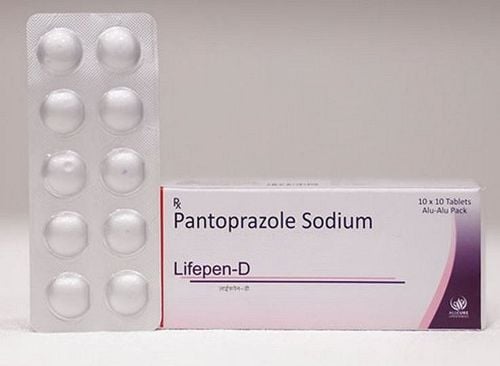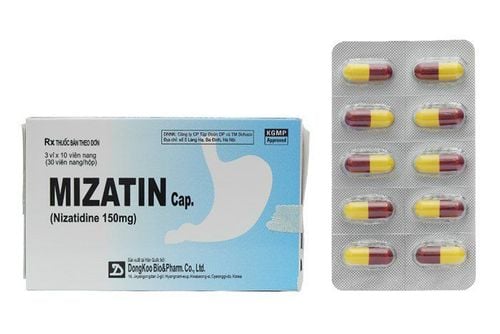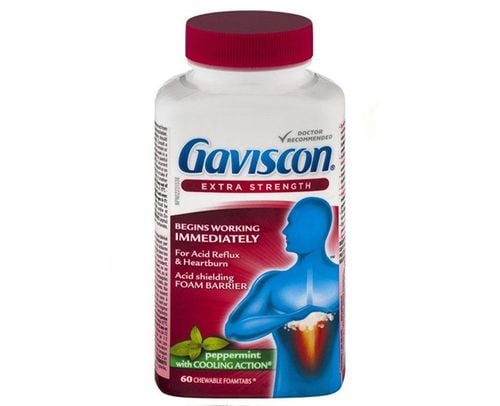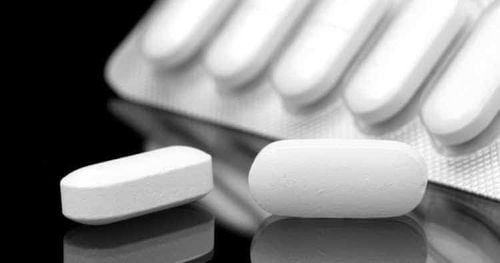This is an automatically translated article.
Nizatidine belongs to a class of drugs known as H2 blockers. Nizatidine is used to treat stomach and intestinal ulcers and prevent recurrence after they have healed. This medicine is also used to treat ulcers of the esophagus and gastroesophageal reflux disease. Nizatidine works to reduce the amount of acid in your stomach. Thereby helping to relieve symptoms such as cough that does not go away, stomach pain, heartburn and difficulty swallowing.1. Indications and contraindications of the drug Nizatidine
Nizatidine drug is indicated in the following cases:Heartburn Increased gastric acidity due to systemic mastocytosis Multiple endocrine neoplasia Inflammation of the esophagus due to reflux of gastric acid. Esophagitis with erosion Gastroesophageal reflux disease Stomach ulcer Duodenal ulcer Medicines for the healing of duodenal ulcers Overproduction of stomach acid Zollinger-Ellison syndrome Indigestion Nizatidine is contraindicated in the following conditions: the following cases:
Stomach cancer Chronic kidney disease stage 3A, 3B, 4, 5. Kidney disease

Nizatidine được sử dụng để điều trị loét dạ dày và ruột và ngăn ngừa tái phát sau khi chúng đã lành
2. How to use Nizatidine
Take Nizatidine by mouth with or without food as directed by your doctor, usually once or twice a day. If you are taking it in a once-daily dose, it is usually taken right before bedtime. If you are using the liquid form of Nizatidine, measure the dose carefully using a special measuring spoon/gauge.The dose and duration of treatment with Nizatidine are calculated based on your medical condition and response to treatment. In some cases, it is possible to take an antacid along with this medicine.
Use Nizatidine medicine regularly to get the most benefit from it. To help you remember to take your medication, take it at the same time(s) each day. Do not increase your dose or use Nizatidine more often or for longer than prescribed by your doctor. Keep taking the medicine for the prescribed treatment time even if you feel better.
Lifestyle changes such as reducing stress, stopping smoking, limiting alcohol, and dietary changes (such as avoiding caffeine and certain spices) can help Nizatidine work better. Talk to your doctor to learn about lifestyle changes that may benefit you.
Tests such as endoscopy, kidney function tests may be performed periodically to monitor your progress or check for side effects during treatment with Nizatidine.
Tell your doctor if your condition does not improve or if it worsens after treatment with Nizatidine.

Dùng thuốc Nizatidine bằng đường uống cùng hoặc không cùng với thức ăn theo chỉ dẫn của bác sĩ
3. Nizatidine side effects
While using Nizatidine, you may experience a headache or diarrhea. If one of these effects persists or gets worse, tell your doctor right away.Remember that your doctor has prescribed this medicine for you because he or she has judged that the benefit to you is greater than the risk of side effects. Many people use Nizatidine without any serious side effects.
Tell your doctor right away if you have any serious side effects of Nizatidine, including: Nausea/vomiting that doesn't stop, loss of appetite, stomach/abdominal pain, yellowing eyes/yellowing skin, dark urine, confusion, breast swelling/pain in men, easy bruising/bleeding, signs of infection (such as sore throat, fever, chills), fast/pounding heart unusual fatigue.
A very serious allergic reaction to Nizatidine is very rare. However, if you notice any symptoms of a serious allergic reaction, including: Rash, itching/swelling (especially of the face/tongue/throat), trouble breathing, dizziness, seek medical advice. immediate medical help.
Below are Nizatidine side effects by likelihood.
Common side effects of Nizatidine include:
Drowsiness Uncommon side effects of Nizatidine include:
Excessive sweating Rare side effects of Nizatidine include:
Thrombocytopenia bewilderment Slow heartbeat Bronchospasm Allergic dermatitis Fever Skin rash Angioedema Angioedema This is not a complete list of possible side effects of Nizatidine medicine. If you notice other side effects of Nizatidine medicine not listed above, contact your doctor immediately for timely treatment.

Buồn ngủ là một tác dụng phụ thường gặp của thuốc Nizatidine
4. Measures to prevent side effects of the drug Nizatidine
Before taking nizatidine, tell your doctor if you are allergic to this medicine or to other H2 blockers (cimetidine, famotidine, ranitidine) and to any other allergies, if any. Nizatidine products may contain ineffective ingredients that can cause allergic reactions or other problems.Before using Nizatidine, tell your doctor your medical history, especially of: Immune system problems, kidney problems, liver problems, certain lung diseases (such as chronic obstructive pulmonary disease (COPD), other stomach problems (such as a tumor).
Some symptoms may indicate a more serious condition. Get medical help right away if you have symptoms such as: heartburn with dizziness/sweating/dizziness, chest/jaw/arm/shoulder pain (especially trouble breathing, unusual sweating usually), unexplained weight loss.
Before surgery, tell your doctor or dentist that you are being treated with Nizatidine.
Women during pregnancy, should only use Nizatidine when absolutely necessary. Discuss the risks and benefits of Nizatidine with your doctor. Nizatidine passes into breast milk, so women who are breastfeeding should consult their doctor before use.
5. Nizatidine drug interactions
Drug interactions can change the way nizatidine works or increase your risk of serious side effects. Tell your doctor about all prescription/nonprescription drugs and herbal products. Do not start, stop, or change the dose of any medicine while using Nizatidine, without your doctor's approval.Some medicines and products need stomach acid for the body to absorb them properly. Nizatidine reduces acid in the stomach, so it may change how well these medicines or products work. Some of the affected drugs include atazanavir, dasatinib, delavirdine, some azole antifungals (such as itraconazole, ketoconazole), pazopanib, and others.
Do not take Nizatidine with other products containing nizatidine or other H2 blockers (cimetidine, famotidine, ranitidine).
Nizatidine may interfere with certain tests including some tests for protein in the urine, possibly causing false test results. Make sure laboratory staff and all your doctors know you are using Nizatidine.

Tương tác thuốc có thể thay đổi cách hoạt động của thuốc Nizatidine hoặc làm tăng nguy cơ mắc các tác dụng phụ
6. What to do if you overdose or forget to take Nizatidine?
If you or someone else has overdosed on Nizatidine and has severe symptoms such as fainting or difficulty breathing, call 911 immediately.If you miss a dose of Nizatidine, take it as soon as you remember. If it is almost time for your next dose, skip the missed dose. Use your usual dose of Nizatidine at the usual time, do not double the usual dose.
7. How to store Nizatidine thuốc
Store Nizatidine at room temperature, away from light and moisture, do not store in the bathroom, keep the medicine away from children and pets.Dispose of Nizatidine medication appropriately when it is expired or no longer needed.
Please dial HOTLINE for more information or register for an appointment HERE. Download MyVinmec app to make appointments faster and to manage your bookings easily.
Reference source: webmd.com












